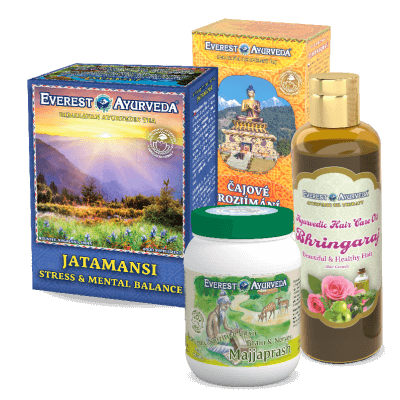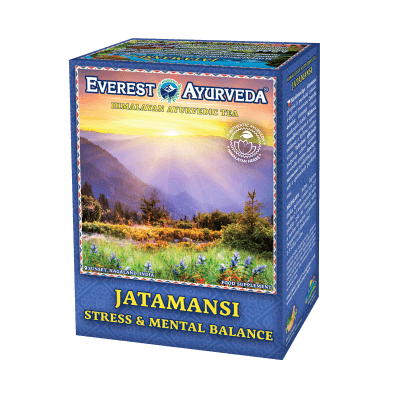
Are you more prone to mental depression and feelings of sadness, loneliness, tension and stress? Difficult life situations are important experiences that teach us how to better understand ourselves and how to bring more harmony, light, renewal, inspiration, smile, relaxation and peace into our lives.
Stress is a body's defense mechanism during life crisis. In times of danger, it causes increased production of hormones, which help us to respond immediately to the situation under the slogan "fight or run" in accordance with our constitution. If we consider stress not just a harmful thing, but rather a useful warning signal that points to the need for our own changes in our lives, then we will be able to prevent its negative effects.
Stress Factors
Feelings of stress are caused by many everyday factors, such as: hectic morning, traffic jams, aggressive driving, conflicted relationships, fear, an annoying boss, accumulated work tasks, time pressure, overwork or burnout. They result in disorders of digestion and metabolism, weight loss, fatigue and exhaustion, dysfunction of the cardiovascular, nervous and reproductive systems, weakened immunity, muscle spasm and stiffness of the musculoskeletal system. Excessive stress causes irritability, difficult communication and the feeling that no one understands us.
Stress Affects the Body's Organs
According to Ayurveda, emotions are directly connected to bodily organs. Negative emotions that we suppress and do not process cannot come out, accumulate in the organs and can cause organ stress in them.
One of the important organs where emotions are stored is our liver. The liver, as an important part of metabolism, digests fats and processes proteins. It also houses the so-called bhuta agni, a fire that takes care of the transformation. In the case of undigested emotions, the liver becomes the seat of anger, enmity and jealousy. These emotions must be processed - to realize them and thus accept them, so that we let them go. It is always good to focus in this process on positive thoughts and experiences that give us the strength we need, not on problematic emotions. However, if we suppress these emotions at the same time and do not want to acknowledge them, they accumulate in the tissues and lead to disease.
The skin is also associated with the liver and other organs. Beneath its surface is connective tissue, in which unresolved anger, fear and stress accumulate. When we experience anger, the skin turns red, when we are stressed or anxious, our breathing is shallow and irregular and the skin pale.
Stress and Aging
Negative emotions such as anxiety, worries, nervousness and insecurity flow in the plasma tissue and cause biochemical changes in the body, which circulate in the body, act as stressors and participate in the aging process. The best cure for negative emotions is to cultivate faith in a higher principle that supplies the body with positive emotions in the form of love and trust. Under stress, for example, blood vessels shrink, a person retreats and is stiff. As a prevention of stressful conditions and gradually better management of stressful situations, regular meditation is recommended, which dilates blood vessels, relaxes and induces a state of rest. When we meditate, the plasma tissue flows rhythmically and quietly, the cells are better oxygenated by slow and deep breathing, and we feel natural calm.
Stress and tension also result in muscle stiffness. Muscles stressed in this way are also one of the causes of aging. When muscles are stressed, wrinkles form because skin regeneration is associated with muscle regeneration and nutrition. In Ayurveda, an oil is used in the cleansing process on the skin, which rubs into the skin and penetrates all the way to the muscles, helping to release repressed emotions. This is how sesame oil works, which stimulates the central nervous system. An oil massage can help dissolve unresolved emotions.
During stress, our tongue also dries out and there is insufficient production of saliva, which destroys bacteria in the mouth, which leads, for example, to an inability to perceive tastes correctly. One of the well-known Ayurvedic tips is to wipe the coating off your tongue in the morning when brushing your teeth to remove dead bacteria.
7 Simple Tips for Better Stress Management and Healthy Relaxation:
1. Slow down your constantly busy rhythm of life.
2. Pay more attention, learn to relax and indulge in a nourishing sleep.
3. Take a hot bath.
4. Take care of your skin and rub it with sesame oil.
5. Regenerate the body through meditation, exercise, sports or staying in nature.
6. Read inspirational books.
7. Share quiet moments with people who understand you.
If a person is able to take on the role of an impartial observer towards himself, then he will better understand what his weaknesses and inclinations are. Then he can effectively make changes in diet and lifestyle to maintain good health, which is manifested by moderate appetite, good digestion, regular excretion, clear voice, absence of pain, refreshing sleep, good looks, mental stability, energy, perseverance, enthusiasm, composure, calm and compassion.
A person who always eats whole food, lives a regular life, maintains a detachment to sense objects, gives and forgives, loves the truth and serves others, is disease-free. - Ayurvedic wisdom





